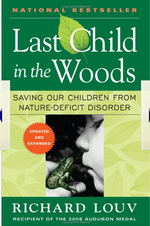Last Child in the Woods by Richard Louv

The thesis of this book is directed toward children. It combines research and speculation to argue that exposure to nature is essential for healthy childhood development and that many children now suffer from something Louv calls “nature-deficit disorder.”
He makes a good argument. Including an argument that nature is not only important for children.
One argument he makes is that many tasks we engage in have a tendency to deplete our resources for directed attention. That we, in turn, get something he calls “directed-attention fatigue”. He then goes on to argue that being out in nature restores this fatigue by offering us involuntary attention or fascination. Non-task-oriented experience.
To cite just one piece of evidence, he reports on a study done in Sweden.
Forty minutes in nature as an antidote to “directed-attention fatigue.” This sounds like good medicine to me. And now, with the beginning of spring—at least in my hemisphere—it would seem like the perfect time to try it out.

